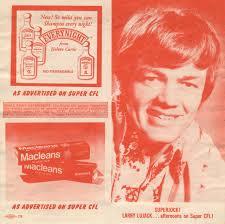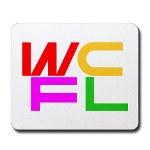

Between 1963 and 1965, WLS was the only Top 40 station in Chicago. This situation was unusual, as most major cities had two or even three stations featuring pop music. Consequently, WLS had become somewhat complacent as it had no real competitors. This all changed in 1965, when WCFL became a Top 40 music station, competing with WLS. The station also moved from the American Furniture Mart where it had been since 1931, to the then new Marina City, where it remained for the next 20 years. While the station itself was on the 16th floor of the Commercial Building (today the Hotel Chicago Downtown), WCFL also had a "VIP Room" on the fifth floor where the "WCFL VIPs" (DJs) hosted various events such as record parties and autograph sessions for listeners who were members of the WCFL VIP Club. One of the station's first promotions was the "Bold" campaign-describing itself as a bold, new way of presenting today's music and its listeners (who wore "I'm Bold!" buttons) as bold enough to want a change.
General Manager Ken Draper ran the station from 1965–1968 and brought many of the original staffers with him from the big Cleveland rock station (KYW/WKYC) he had run before. These included not only DJs but also chief engineer Mike King (later, Jim Loupas), and members of the crack newsroom team, which included the unstoppable Jeff Kamen. WCFL gained fame in 1966 when Kamen followed Chicago Civil Rights leader and comedy star Dick Gregory to Mississippi and wound getting beaten by the KKK while reporting on a voter registration protest. The network TV film of the attack was seen by millions. A still picture ending up on newspapers' front pages. Prior to Draper's establishment of an eight-person news department, news was gathered by taking the copy from the station's news wires and reading it on the air.
In their Top 40 years, some famous disc jockeys on WCFL included Jim Runyon (1931–1973), Joel Sebastian (1932-1986), Dick Williamson, (who was already with WCFL at the time of the format change), Jim Stagg (1935–2007), Ron Britain, ("America's First Psychedelic Disk Johnny"), who did a second stint at the station in 1978, the legendary Dick Biondi, whose Mutual Radio syndicated Dick Biondi's Young America show was heard here 3 years before his actual arrival, Barney Pip (1936-1994), Ron Riley, Sid McCoy and Yvonne Daniels (1991) with late night jazz during the earliest days of the change to Top 40. In late 1966, WKYC popular afternoon DJ Jerry Ghan (now Jerry G. Bishop)(1936-2013) also decided to follow Draper to WCFL for AM drive. Later, WIND's former long-time morning man Howard Miller (1994), who was a decided departure from the youthful staff, came to helm 'CFL's 6-9AM spot in 1968. He was replaced before long by Clark Weber, long-time WLS morning man.
The DJ secretary during this era was Connie Szerszen, who went on to forge her own career on the air in Chicago radio, appearing on WIND and other stations. WCFL General Manager Ken Draper also hired Carole Simpson as one of radio's first female newscasters; Carole went on to a big career with ABC-TV. Also on staff at that time was continuity director Barbara Sternig, who left for LA once the Beatles broke up, became Rona Barrett's writer, and later Senior Reporter in Hollywood for the National Enquirer. Draper is also credited with the introduction of the Sound 10/WCFL survey, which became a competitor to the WLS "Silver Dollar Survey" that station issued weekly beginning in 1960. From 1966–1970, the station produced six "branded" record albums. Later in the SuperCFL-era Larry Lujack (1940-2013) and Art Roberts (1931-2002) came to WCFL.
WCFL's coverage of The Beatles 1965 and 1966 US tours was provided by Jim Stagg, who traveled with the group. The station began a weekly British Countdown program with British DJ Paul Michael, in 1965.
During the late 1960s and early 1970s, WCFL also featured a popular Sunday night program of "underground" album-oriented music called Ron Britain's Subterranean Circus. Due to madcap DJ Britain's sure ear for the innovative and his highly inventive sketches, plus WCFL's powerful AM nighttime signal, these programs gained huge listenership not just in the Chicago area, but in other parts of the country as well. Britain's "Sub Circus" made WCFL one of the few AM stations to feature this kind of music, which was a major staple of "underground" FM stations. The station also supported local bands with its Sunday evening "Chicago Countdown", hosted by Ron Britain, featuring the recordings of Chicago area music groups.
The comedy feature Chickenman, a satire based on the Batman TV series, originated on Jim Runyon's morning drive-time show in the fall of 1966. It was created by WCFL staffer Dick Orkin, who was also brought from Cleveland to Chicago by Ken Draper. All the voices were done by Orkin, Runyon, and Jane Roberts, who also did WCFL's morning traffic reports as "Trooper 36-24-36" (She became Mrs. Jim Runyon.). The Chickenman program was subsequently syndicated to radio stations worldwide.
In August 1968, sales manager Lew Witz replaced Draper as WCFL General Manager. Witz continued to make changes to the station during his tenure. It was Witz who lured Larry Lujack away from WLS in 1972, and the "less talk-more music" philosophy continued. On August 8, 1974, Richard Nixon announced his resignation from the office of President of the United States. The announcement occurred at 8 PM Chicago time, but there was no acknowledgement of it on WCFL's airwaves until 11:30 PM. Witz defended his decision by saying there was ample local and national coverage of the story so there was no need to interrupt the music on WCFL. Gary Deeb, media critic for the Chicago Tribune, blasted Witz in print, saying it was this decision and many others like it that turned WCFL from, "a bright, civic-minded 50,000 watt rock powerhouse into a sonic slum." By the time the station prepared to enter its "Beautiful Music" phase in early 1976, Witz had totally done away with WCFL's news department. Under the management of Witz, the station's turntables used for transferring music onto tape cartridges for broadcast were speeded up from 45rpm to 48rpm. This was meant to make for a "brighter sound" than the station's main rival, WLS, and meant that since it was faster, more music could be aired. Witz also insisted his on-air personalities broadcast false time checks, in the event listeners might be part of Arbitron ratings households.
